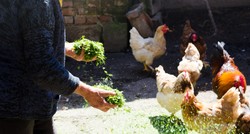Herbal remedies for mycotoxins in the farm animals feed
Mycotoxicoses in farm animals leads to high mortality due to secondary bacterial infections caused by the immunosuppressive effects of mycotoxins. For instance, a particularly widespread mycotoxin affects kidneys in pigs and chickens, resulting in poor weight gain and meat quality in affected animals. The EU-funded HERBAL PROTECTION project planned to evaluate methods to improve the safety of feed contaminated with nephrotoxic mycotoxins to reduce economic losses. The objective was to test the ability of particular herbs with known protective effects on kidney and liver to mitigate mycotoxin damage. Initially 16 herbal extracts were selected and analysed for the presence of bio-active constituents and antioxidant potential. The selected herbs displayed several important activities: anti-lipid peroxidation; nitric oxide scavenging; site-specific hydroxyl radical scavenging; non-site-specific hydroxyl radical scavenging. The phytochemical analysis of these herbs revealed phenolic content in the range 60 to 85 % and flavonoid content in the range 30 to 70 %. Based on these results, seven herbs were further screened for their efficacy against mycotoxins. Different formulation approaches were employed to increase the solubility and oral absorption of herbal extracts. The goal was to enhance their bioavailability and therapeutic activity. A broad panel of in vivo or ex vivo enzymatic and non-enzymatic tests revealed the protective effects of some herbs against mycotoxin-induced toxicity. The herbs Tinospora cordifolia, Glycyrrhiza glabra, Centella asiatica, Withania somnifera and Silybum marianum proved to have a good protective effect in chickens against the various toxic effects of mycotoxins. The hepatoprotective effect of Tinospora cordifolia and Glycyrrhiza glabra was stronger, if chickens were additionally supplemented with Glycyrrhiza glabra. The strong immune-suppressive effect of the toxins on humoral immune response against Newcastle disease was completely prevented in birds supplemented with the herbal additives Withania somnifera or Silybum marianum. The HERBAL PROTECTION study provided experimental support for the safe use of the tested herbs and their appropriate mixtures in mycotoxin-contaminated feed. Importantly, the same plant extracts displayed meaningful radio protective potential in several in vitro and in vivo tests.







